Professional Ethics Report: HSBC Bank and Financial Sector
VerifiedAdded on 2020/12/10
|13
|4096
|202
Report
AI Summary
This report delves into the realm of professional ethics, specifically within the context of the finance sector, using HSBC Bank PLC as a focal point. The report commences with an introduction to the fundamental principles of ethical behavior, including integrity, objectivity, professional competence, confidentiality, and professional conduct. It then explores the legal, regulatory, and ethical requirements that govern the accounting and finance sector, emphasizing the role of professional bodies in upholding these standards. The report examines the importance of adhering to codes of conduct and the risks associated with improper practices, highlighting the significance of vigilance and maintaining up-to-date knowledge. Furthermore, it discusses ethical working practices with clients, suppliers, and colleagues, emphasizing objectivity and the separation of professional and personal life. It underscores the importance of adhering to organizational policies for handling clients' monies and addresses the reporting of unethical behavior, breaches of confidentiality, and other malpractice. Finally, the report explores the ethical approach to sustainability and the responsibilities of finance professionals in upholding sustainability principles. The report concludes with a synthesis of the key themes and findings.
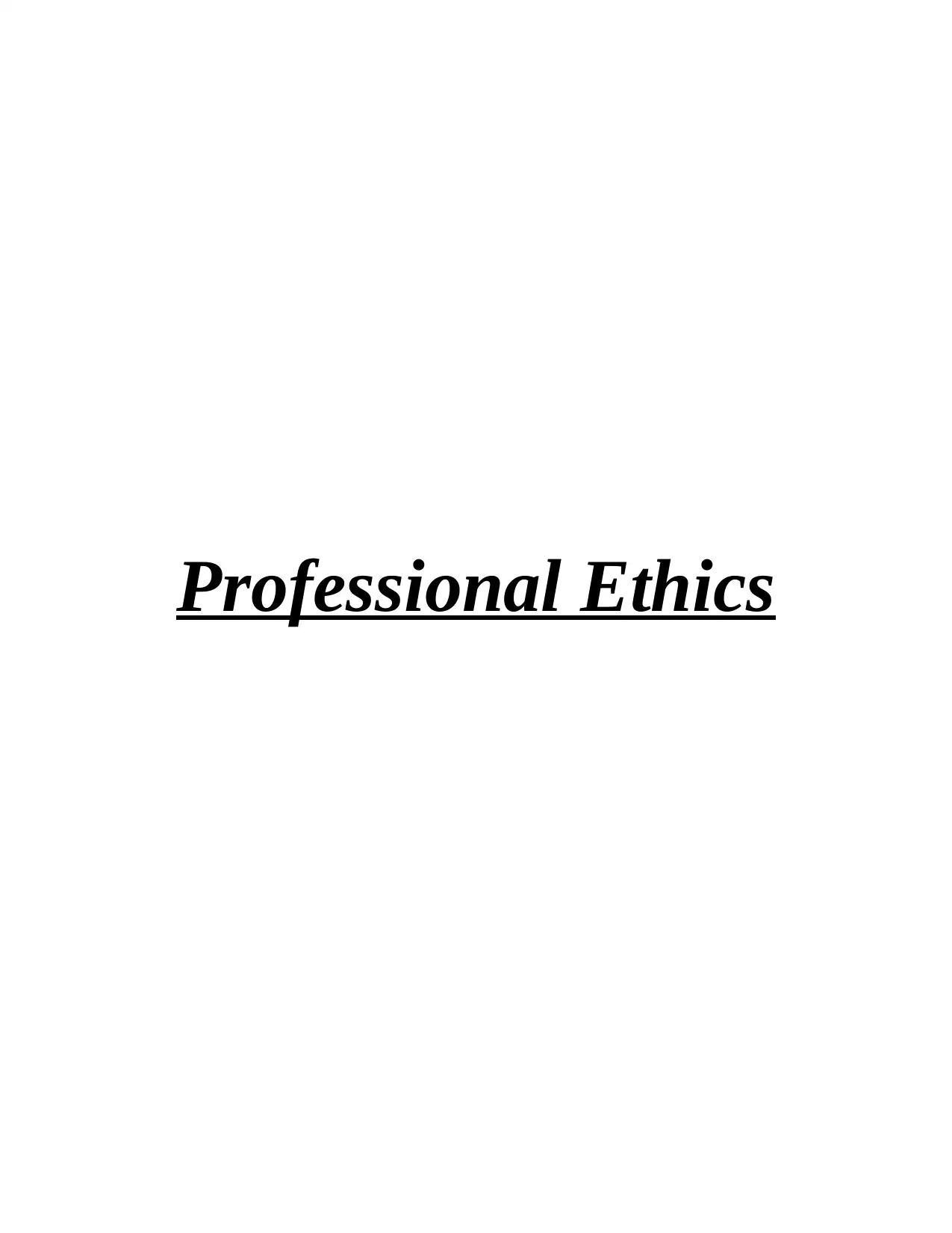
Professional Ethics
Paraphrase This Document
Need a fresh take? Get an instant paraphrase of this document with our AI Paraphraser
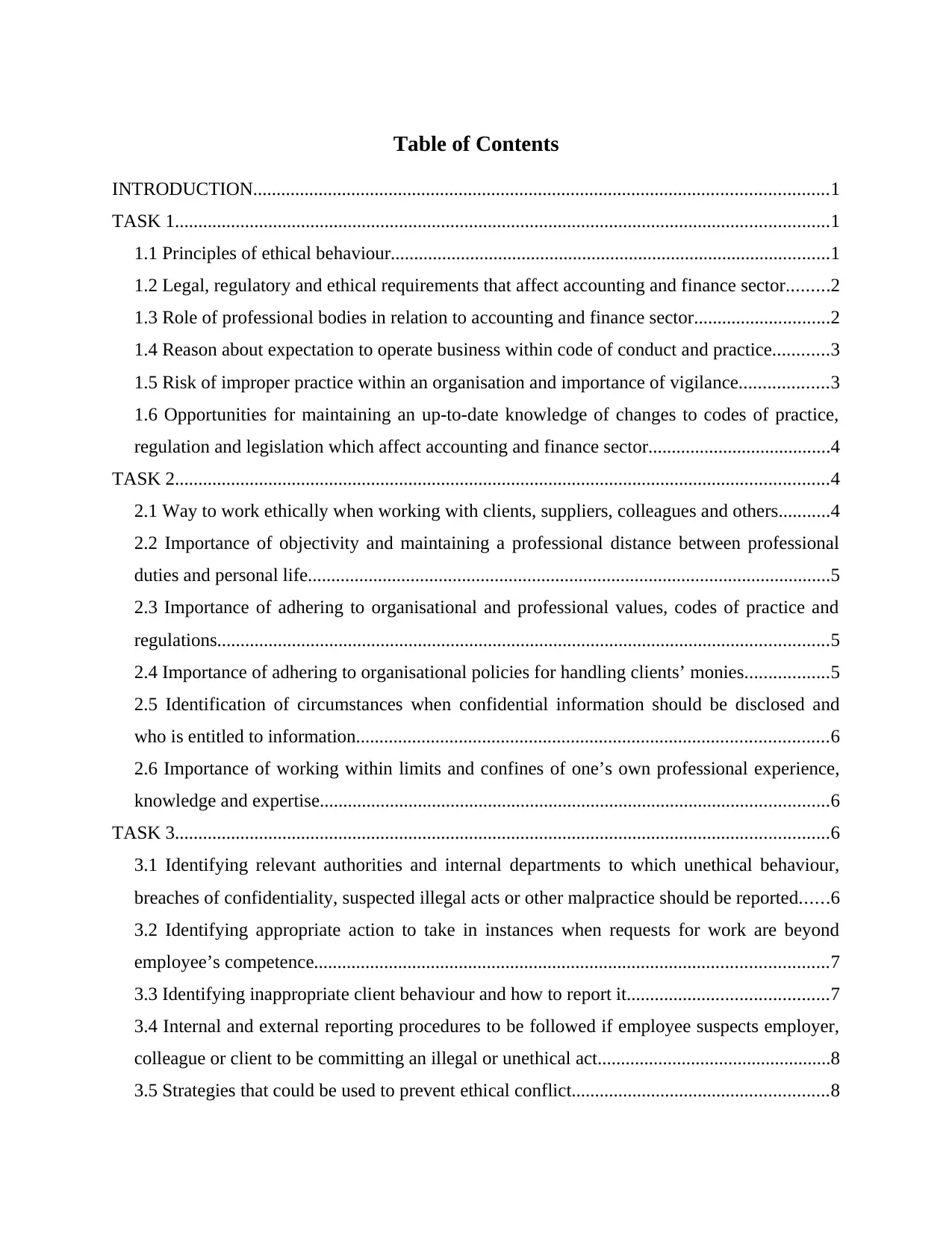
Table of Contents
INTRODUCTION...........................................................................................................................1
TASK 1............................................................................................................................................1
1.1 Principles of ethical behaviour..............................................................................................1
1.2 Legal, regulatory and ethical requirements that affect accounting and finance sector.........2
1.3 Role of professional bodies in relation to accounting and finance sector.............................2
1.4 Reason about expectation to operate business within code of conduct and practice............3
1.5 Risk of improper practice within an organisation and importance of vigilance...................3
1.6 Opportunities for maintaining an up-to-date knowledge of changes to codes of practice,
regulation and legislation which affect accounting and finance sector.......................................4
TASK 2............................................................................................................................................4
2.1 Way to work ethically when working with clients, suppliers, colleagues and others...........4
2.2 Importance of objectivity and maintaining a professional distance between professional
duties and personal life................................................................................................................5
2.3 Importance of adhering to organisational and professional values, codes of practice and
regulations...................................................................................................................................5
2.4 Importance of adhering to organisational policies for handling clients’ monies..................5
2.5 Identification of circumstances when confidential information should be disclosed and
who is entitled to information.....................................................................................................6
2.6 Importance of working within limits and confines of one’s own professional experience,
knowledge and expertise.............................................................................................................6
TASK 3............................................................................................................................................6
3.1 Identifying relevant authorities and internal departments to which unethical behaviour,
breaches of confidentiality, suspected illegal acts or other malpractice should be reported......6
3.2 Identifying appropriate action to take in instances when requests for work are beyond
employee’s competence..............................................................................................................7
3.3 Identifying inappropriate client behaviour and how to report it...........................................7
3.4 Internal and external reporting procedures to be followed if employee suspects employer,
colleague or client to be committing an illegal or unethical act..................................................8
3.5 Strategies that could be used to prevent ethical conflict.......................................................8
INTRODUCTION...........................................................................................................................1
TASK 1............................................................................................................................................1
1.1 Principles of ethical behaviour..............................................................................................1
1.2 Legal, regulatory and ethical requirements that affect accounting and finance sector.........2
1.3 Role of professional bodies in relation to accounting and finance sector.............................2
1.4 Reason about expectation to operate business within code of conduct and practice............3
1.5 Risk of improper practice within an organisation and importance of vigilance...................3
1.6 Opportunities for maintaining an up-to-date knowledge of changes to codes of practice,
regulation and legislation which affect accounting and finance sector.......................................4
TASK 2............................................................................................................................................4
2.1 Way to work ethically when working with clients, suppliers, colleagues and others...........4
2.2 Importance of objectivity and maintaining a professional distance between professional
duties and personal life................................................................................................................5
2.3 Importance of adhering to organisational and professional values, codes of practice and
regulations...................................................................................................................................5
2.4 Importance of adhering to organisational policies for handling clients’ monies..................5
2.5 Identification of circumstances when confidential information should be disclosed and
who is entitled to information.....................................................................................................6
2.6 Importance of working within limits and confines of one’s own professional experience,
knowledge and expertise.............................................................................................................6
TASK 3............................................................................................................................................6
3.1 Identifying relevant authorities and internal departments to which unethical behaviour,
breaches of confidentiality, suspected illegal acts or other malpractice should be reported......6
3.2 Identifying appropriate action to take in instances when requests for work are beyond
employee’s competence..............................................................................................................7
3.3 Identifying inappropriate client behaviour and how to report it...........................................7
3.4 Internal and external reporting procedures to be followed if employee suspects employer,
colleague or client to be committing an illegal or unethical act..................................................8
3.5 Strategies that could be used to prevent ethical conflict.......................................................8
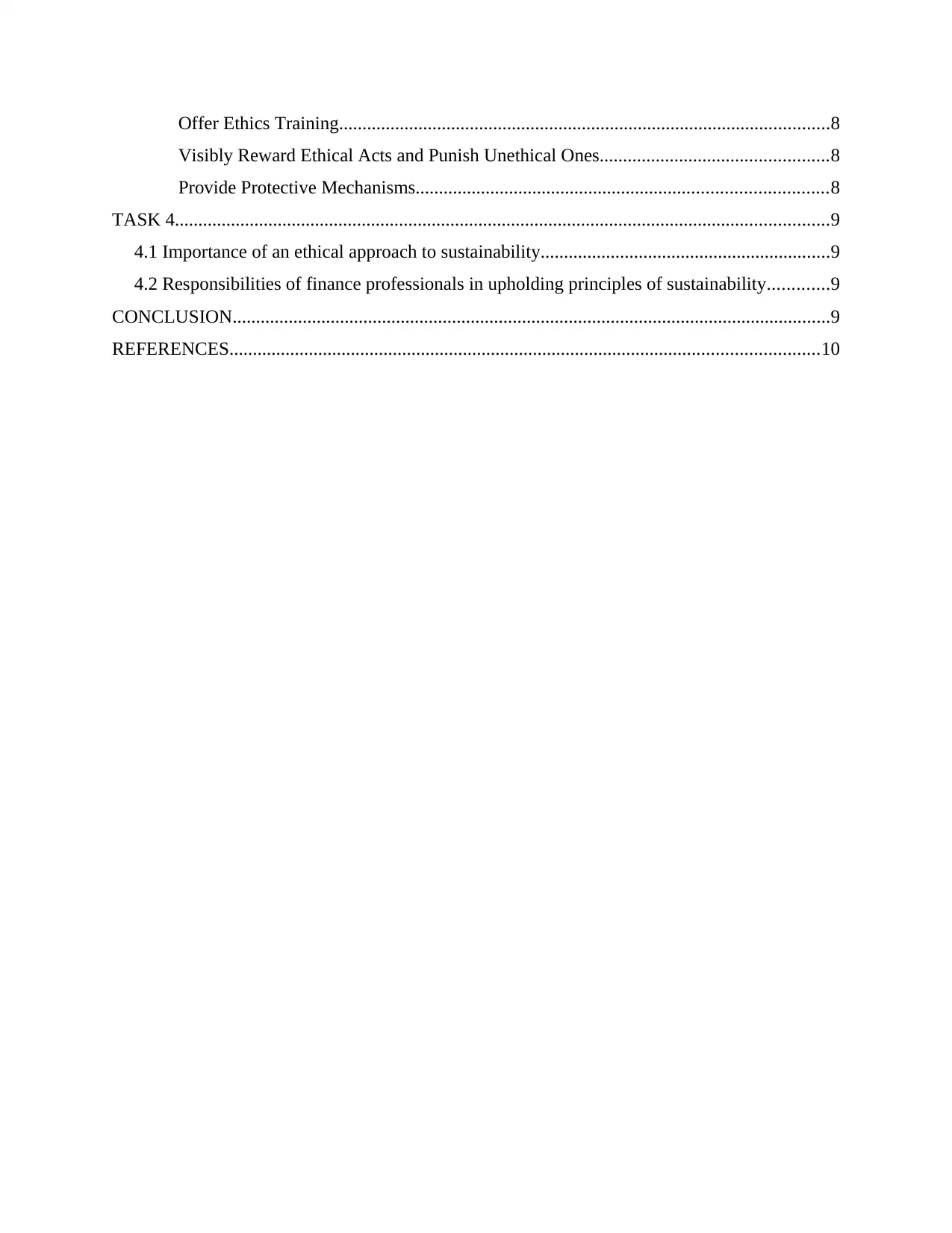
Offer Ethics Training.........................................................................................................8
Visibly Reward Ethical Acts and Punish Unethical Ones.................................................8
Provide Protective Mechanisms........................................................................................8
TASK 4............................................................................................................................................9
4.1 Importance of an ethical approach to sustainability..............................................................9
4.2 Responsibilities of finance professionals in upholding principles of sustainability.............9
CONCLUSION................................................................................................................................9
REFERENCES..............................................................................................................................10
Visibly Reward Ethical Acts and Punish Unethical Ones.................................................8
Provide Protective Mechanisms........................................................................................8
TASK 4............................................................................................................................................9
4.1 Importance of an ethical approach to sustainability..............................................................9
4.2 Responsibilities of finance professionals in upholding principles of sustainability.............9
CONCLUSION................................................................................................................................9
REFERENCES..............................................................................................................................10
⊘ This is a preview!⊘
Do you want full access?
Subscribe today to unlock all pages.

Trusted by 1+ million students worldwide
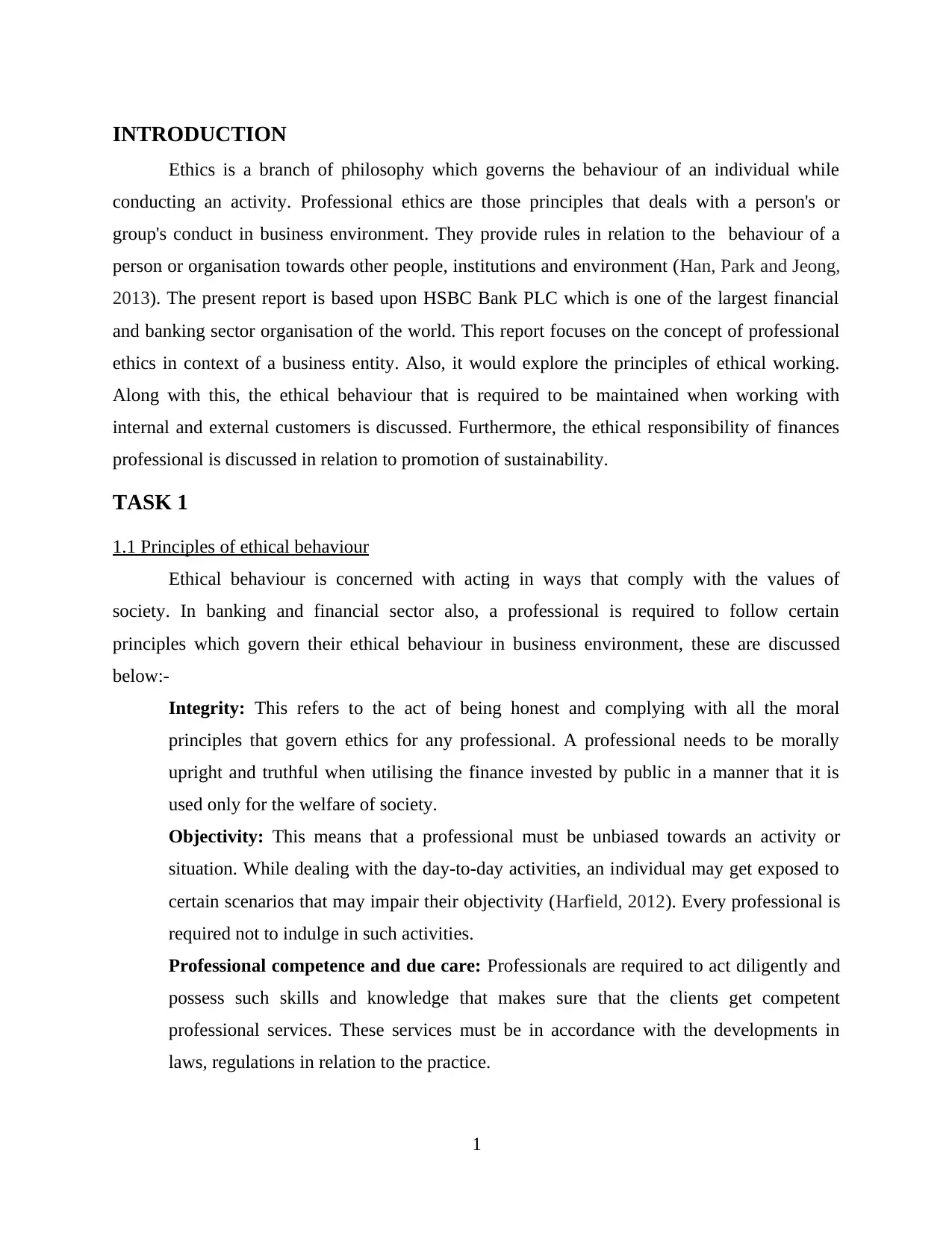
INTRODUCTION
Ethics is a branch of philosophy which governs the behaviour of an individual while
conducting an activity. Professional ethics are those principles that deals with a person's or
group's conduct in business environment. They provide rules in relation to the behaviour of a
person or organisation towards other people, institutions and environment (Han, Park and Jeong,
2013). The present report is based upon HSBC Bank PLC which is one of the largest financial
and banking sector organisation of the world. This report focuses on the concept of professional
ethics in context of a business entity. Also, it would explore the principles of ethical working.
Along with this, the ethical behaviour that is required to be maintained when working with
internal and external customers is discussed. Furthermore, the ethical responsibility of finances
professional is discussed in relation to promotion of sustainability.
TASK 1
1.1 Principles of ethical behaviour
Ethical behaviour is concerned with acting in ways that comply with the values of
society. In banking and financial sector also, a professional is required to follow certain
principles which govern their ethical behaviour in business environment, these are discussed
below:-
Integrity: This refers to the act of being honest and complying with all the moral
principles that govern ethics for any professional. A professional needs to be morally
upright and truthful when utilising the finance invested by public in a manner that it is
used only for the welfare of society.
Objectivity: This means that a professional must be unbiased towards an activity or
situation. While dealing with the day-to-day activities, an individual may get exposed to
certain scenarios that may impair their objectivity (Harfield, 2012). Every professional is
required not to indulge in such activities.
Professional competence and due care: Professionals are required to act diligently and
possess such skills and knowledge that makes sure that the clients get competent
professional services. These services must be in accordance with the developments in
laws, regulations in relation to the practice.
1
Ethics is a branch of philosophy which governs the behaviour of an individual while
conducting an activity. Professional ethics are those principles that deals with a person's or
group's conduct in business environment. They provide rules in relation to the behaviour of a
person or organisation towards other people, institutions and environment (Han, Park and Jeong,
2013). The present report is based upon HSBC Bank PLC which is one of the largest financial
and banking sector organisation of the world. This report focuses on the concept of professional
ethics in context of a business entity. Also, it would explore the principles of ethical working.
Along with this, the ethical behaviour that is required to be maintained when working with
internal and external customers is discussed. Furthermore, the ethical responsibility of finances
professional is discussed in relation to promotion of sustainability.
TASK 1
1.1 Principles of ethical behaviour
Ethical behaviour is concerned with acting in ways that comply with the values of
society. In banking and financial sector also, a professional is required to follow certain
principles which govern their ethical behaviour in business environment, these are discussed
below:-
Integrity: This refers to the act of being honest and complying with all the moral
principles that govern ethics for any professional. A professional needs to be morally
upright and truthful when utilising the finance invested by public in a manner that it is
used only for the welfare of society.
Objectivity: This means that a professional must be unbiased towards an activity or
situation. While dealing with the day-to-day activities, an individual may get exposed to
certain scenarios that may impair their objectivity (Harfield, 2012). Every professional is
required not to indulge in such activities.
Professional competence and due care: Professionals are required to act diligently and
possess such skills and knowledge that makes sure that the clients get competent
professional services. These services must be in accordance with the developments in
laws, regulations in relation to the practice.
1
Paraphrase This Document
Need a fresh take? Get an instant paraphrase of this document with our AI Paraphraser
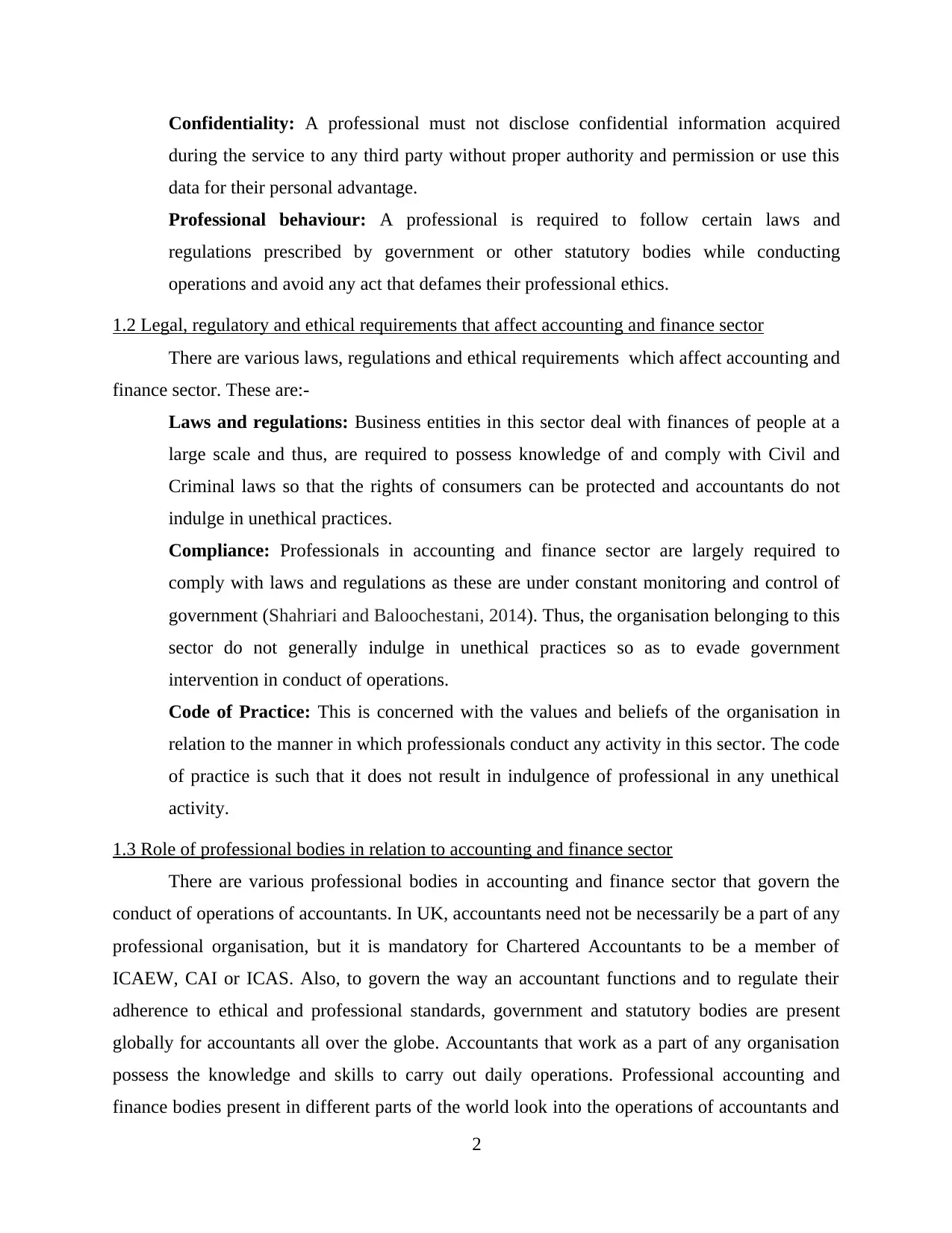
Confidentiality: A professional must not disclose confidential information acquired
during the service to any third party without proper authority and permission or use this
data for their personal advantage.
Professional behaviour: A professional is required to follow certain laws and
regulations prescribed by government or other statutory bodies while conducting
operations and avoid any act that defames their professional ethics.
1.2 Legal, regulatory and ethical requirements that affect accounting and finance sector
There are various laws, regulations and ethical requirements which affect accounting and
finance sector. These are:-
Laws and regulations: Business entities in this sector deal with finances of people at a
large scale and thus, are required to possess knowledge of and comply with Civil and
Criminal laws so that the rights of consumers can be protected and accountants do not
indulge in unethical practices.
Compliance: Professionals in accounting and finance sector are largely required to
comply with laws and regulations as these are under constant monitoring and control of
government (Shahriari and Baloochestani, 2014). Thus, the organisation belonging to this
sector do not generally indulge in unethical practices so as to evade government
intervention in conduct of operations.
Code of Practice: This is concerned with the values and beliefs of the organisation in
relation to the manner in which professionals conduct any activity in this sector. The code
of practice is such that it does not result in indulgence of professional in any unethical
activity.
1.3 Role of professional bodies in relation to accounting and finance sector
There are various professional bodies in accounting and finance sector that govern the
conduct of operations of accountants. In UK, accountants need not be necessarily be a part of any
professional organisation, but it is mandatory for Chartered Accountants to be a member of
ICAEW, CAI or ICAS. Also, to govern the way an accountant functions and to regulate their
adherence to ethical and professional standards, government and statutory bodies are present
globally for accountants all over the globe. Accountants that work as a part of any organisation
possess the knowledge and skills to carry out daily operations. Professional accounting and
finance bodies present in different parts of the world look into the operations of accountants and
2
during the service to any third party without proper authority and permission or use this
data for their personal advantage.
Professional behaviour: A professional is required to follow certain laws and
regulations prescribed by government or other statutory bodies while conducting
operations and avoid any act that defames their professional ethics.
1.2 Legal, regulatory and ethical requirements that affect accounting and finance sector
There are various laws, regulations and ethical requirements which affect accounting and
finance sector. These are:-
Laws and regulations: Business entities in this sector deal with finances of people at a
large scale and thus, are required to possess knowledge of and comply with Civil and
Criminal laws so that the rights of consumers can be protected and accountants do not
indulge in unethical practices.
Compliance: Professionals in accounting and finance sector are largely required to
comply with laws and regulations as these are under constant monitoring and control of
government (Shahriari and Baloochestani, 2014). Thus, the organisation belonging to this
sector do not generally indulge in unethical practices so as to evade government
intervention in conduct of operations.
Code of Practice: This is concerned with the values and beliefs of the organisation in
relation to the manner in which professionals conduct any activity in this sector. The code
of practice is such that it does not result in indulgence of professional in any unethical
activity.
1.3 Role of professional bodies in relation to accounting and finance sector
There are various professional bodies in accounting and finance sector that govern the
conduct of operations of accountants. In UK, accountants need not be necessarily be a part of any
professional organisation, but it is mandatory for Chartered Accountants to be a member of
ICAEW, CAI or ICAS. Also, to govern the way an accountant functions and to regulate their
adherence to ethical and professional standards, government and statutory bodies are present
globally for accountants all over the globe. Accountants that work as a part of any organisation
possess the knowledge and skills to carry out daily operations. Professional accounting and
finance bodies present in different parts of the world look into the operations of accountants and
2
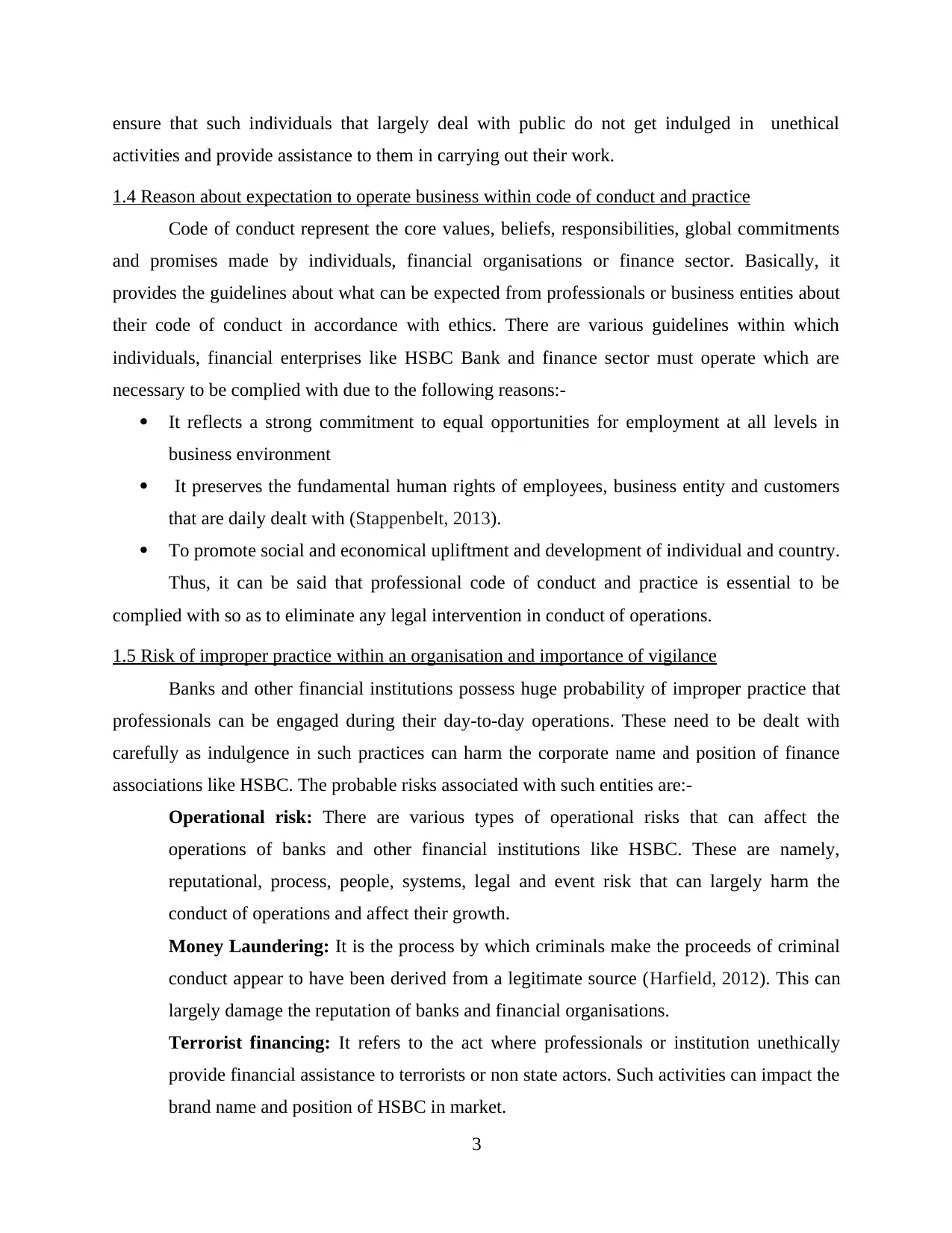
ensure that such individuals that largely deal with public do not get indulged in unethical
activities and provide assistance to them in carrying out their work.
1.4 Reason about expectation to operate business within code of conduct and practice
Code of conduct represent the core values, beliefs, responsibilities, global commitments
and promises made by individuals, financial organisations or finance sector. Basically, it
provides the guidelines about what can be expected from professionals or business entities about
their code of conduct in accordance with ethics. There are various guidelines within which
individuals, financial enterprises like HSBC Bank and finance sector must operate which are
necessary to be complied with due to the following reasons:-
It reflects a strong commitment to equal opportunities for employment at all levels in
business environment
It preserves the fundamental human rights of employees, business entity and customers
that are daily dealt with (Stappenbelt, 2013).
To promote social and economical upliftment and development of individual and country.
Thus, it can be said that professional code of conduct and practice is essential to be
complied with so as to eliminate any legal intervention in conduct of operations.
1.5 Risk of improper practice within an organisation and importance of vigilance
Banks and other financial institutions possess huge probability of improper practice that
professionals can be engaged during their day-to-day operations. These need to be dealt with
carefully as indulgence in such practices can harm the corporate name and position of finance
associations like HSBC. The probable risks associated with such entities are:-
Operational risk: There are various types of operational risks that can affect the
operations of banks and other financial institutions like HSBC. These are namely,
reputational, process, people, systems, legal and event risk that can largely harm the
conduct of operations and affect their growth.
Money Laundering: It is the process by which criminals make the proceeds of criminal
conduct appear to have been derived from a legitimate source (Harfield, 2012). This can
largely damage the reputation of banks and financial organisations.
Terrorist financing: It refers to the act where professionals or institution unethically
provide financial assistance to terrorists or non state actors. Such activities can impact the
brand name and position of HSBC in market.
3
activities and provide assistance to them in carrying out their work.
1.4 Reason about expectation to operate business within code of conduct and practice
Code of conduct represent the core values, beliefs, responsibilities, global commitments
and promises made by individuals, financial organisations or finance sector. Basically, it
provides the guidelines about what can be expected from professionals or business entities about
their code of conduct in accordance with ethics. There are various guidelines within which
individuals, financial enterprises like HSBC Bank and finance sector must operate which are
necessary to be complied with due to the following reasons:-
It reflects a strong commitment to equal opportunities for employment at all levels in
business environment
It preserves the fundamental human rights of employees, business entity and customers
that are daily dealt with (Stappenbelt, 2013).
To promote social and economical upliftment and development of individual and country.
Thus, it can be said that professional code of conduct and practice is essential to be
complied with so as to eliminate any legal intervention in conduct of operations.
1.5 Risk of improper practice within an organisation and importance of vigilance
Banks and other financial institutions possess huge probability of improper practice that
professionals can be engaged during their day-to-day operations. These need to be dealt with
carefully as indulgence in such practices can harm the corporate name and position of finance
associations like HSBC. The probable risks associated with such entities are:-
Operational risk: There are various types of operational risks that can affect the
operations of banks and other financial institutions like HSBC. These are namely,
reputational, process, people, systems, legal and event risk that can largely harm the
conduct of operations and affect their growth.
Money Laundering: It is the process by which criminals make the proceeds of criminal
conduct appear to have been derived from a legitimate source (Harfield, 2012). This can
largely damage the reputation of banks and financial organisations.
Terrorist financing: It refers to the act where professionals or institution unethically
provide financial assistance to terrorists or non state actors. Such activities can impact the
brand name and position of HSBC in market.
3
⊘ This is a preview!⊘
Do you want full access?
Subscribe today to unlock all pages.

Trusted by 1+ million students worldwide
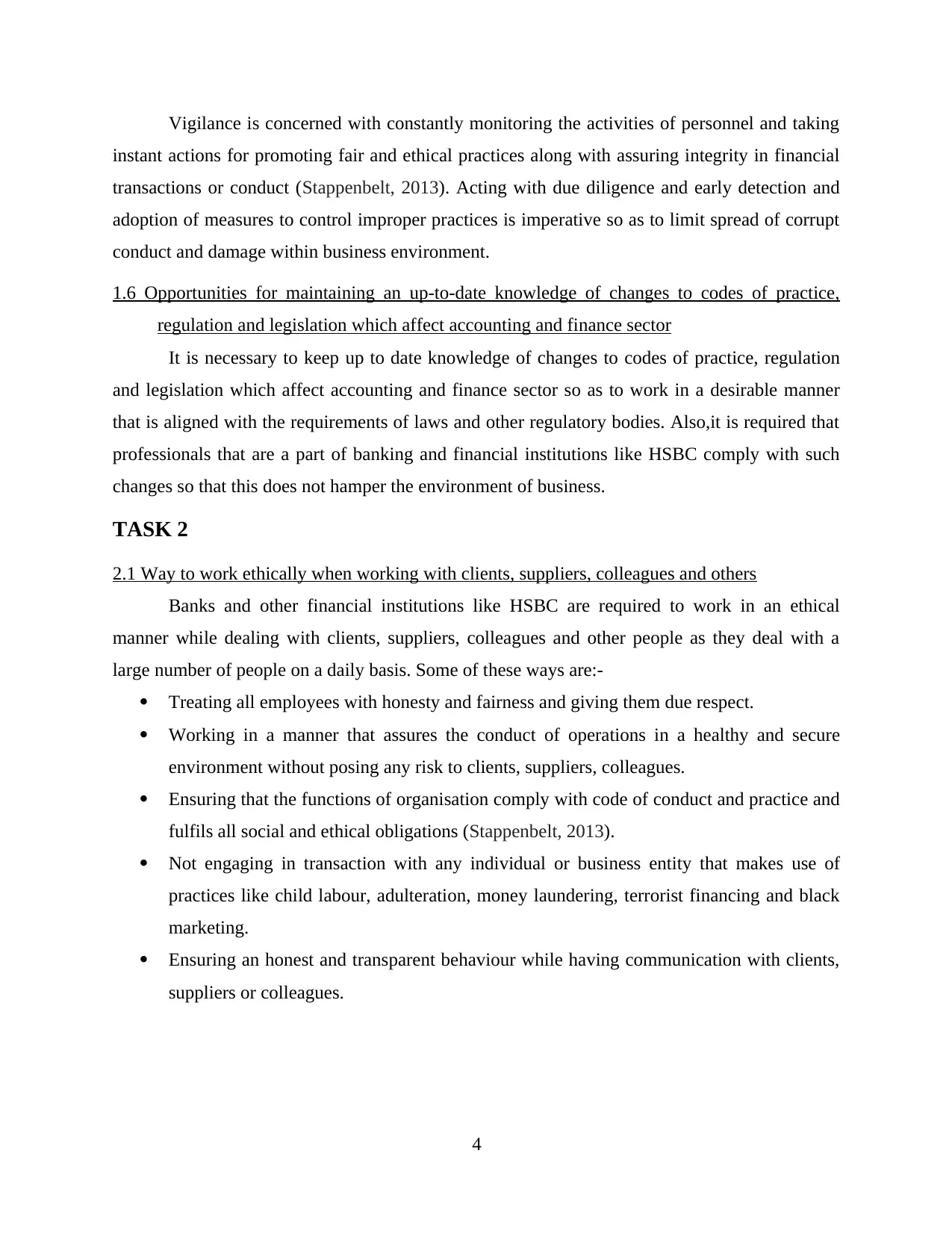
Vigilance is concerned with constantly monitoring the activities of personnel and taking
instant actions for promoting fair and ethical practices along with assuring integrity in financial
transactions or conduct (Stappenbelt, 2013). Acting with due diligence and early detection and
adoption of measures to control improper practices is imperative so as to limit spread of corrupt
conduct and damage within business environment.
1.6 Opportunities for maintaining an up-to-date knowledge of changes to codes of practice,
regulation and legislation which affect accounting and finance sector
It is necessary to keep up to date knowledge of changes to codes of practice, regulation
and legislation which affect accounting and finance sector so as to work in a desirable manner
that is aligned with the requirements of laws and other regulatory bodies. Also,it is required that
professionals that are a part of banking and financial institutions like HSBC comply with such
changes so that this does not hamper the environment of business.
TASK 2
2.1 Way to work ethically when working with clients, suppliers, colleagues and others
Banks and other financial institutions like HSBC are required to work in an ethical
manner while dealing with clients, suppliers, colleagues and other people as they deal with a
large number of people on a daily basis. Some of these ways are:-
Treating all employees with honesty and fairness and giving them due respect.
Working in a manner that assures the conduct of operations in a healthy and secure
environment without posing any risk to clients, suppliers, colleagues.
Ensuring that the functions of organisation comply with code of conduct and practice and
fulfils all social and ethical obligations (Stappenbelt, 2013).
Not engaging in transaction with any individual or business entity that makes use of
practices like child labour, adulteration, money laundering, terrorist financing and black
marketing.
Ensuring an honest and transparent behaviour while having communication with clients,
suppliers or colleagues.
4
instant actions for promoting fair and ethical practices along with assuring integrity in financial
transactions or conduct (Stappenbelt, 2013). Acting with due diligence and early detection and
adoption of measures to control improper practices is imperative so as to limit spread of corrupt
conduct and damage within business environment.
1.6 Opportunities for maintaining an up-to-date knowledge of changes to codes of practice,
regulation and legislation which affect accounting and finance sector
It is necessary to keep up to date knowledge of changes to codes of practice, regulation
and legislation which affect accounting and finance sector so as to work in a desirable manner
that is aligned with the requirements of laws and other regulatory bodies. Also,it is required that
professionals that are a part of banking and financial institutions like HSBC comply with such
changes so that this does not hamper the environment of business.
TASK 2
2.1 Way to work ethically when working with clients, suppliers, colleagues and others
Banks and other financial institutions like HSBC are required to work in an ethical
manner while dealing with clients, suppliers, colleagues and other people as they deal with a
large number of people on a daily basis. Some of these ways are:-
Treating all employees with honesty and fairness and giving them due respect.
Working in a manner that assures the conduct of operations in a healthy and secure
environment without posing any risk to clients, suppliers, colleagues.
Ensuring that the functions of organisation comply with code of conduct and practice and
fulfils all social and ethical obligations (Stappenbelt, 2013).
Not engaging in transaction with any individual or business entity that makes use of
practices like child labour, adulteration, money laundering, terrorist financing and black
marketing.
Ensuring an honest and transparent behaviour while having communication with clients,
suppliers or colleagues.
4
Paraphrase This Document
Need a fresh take? Get an instant paraphrase of this document with our AI Paraphraser
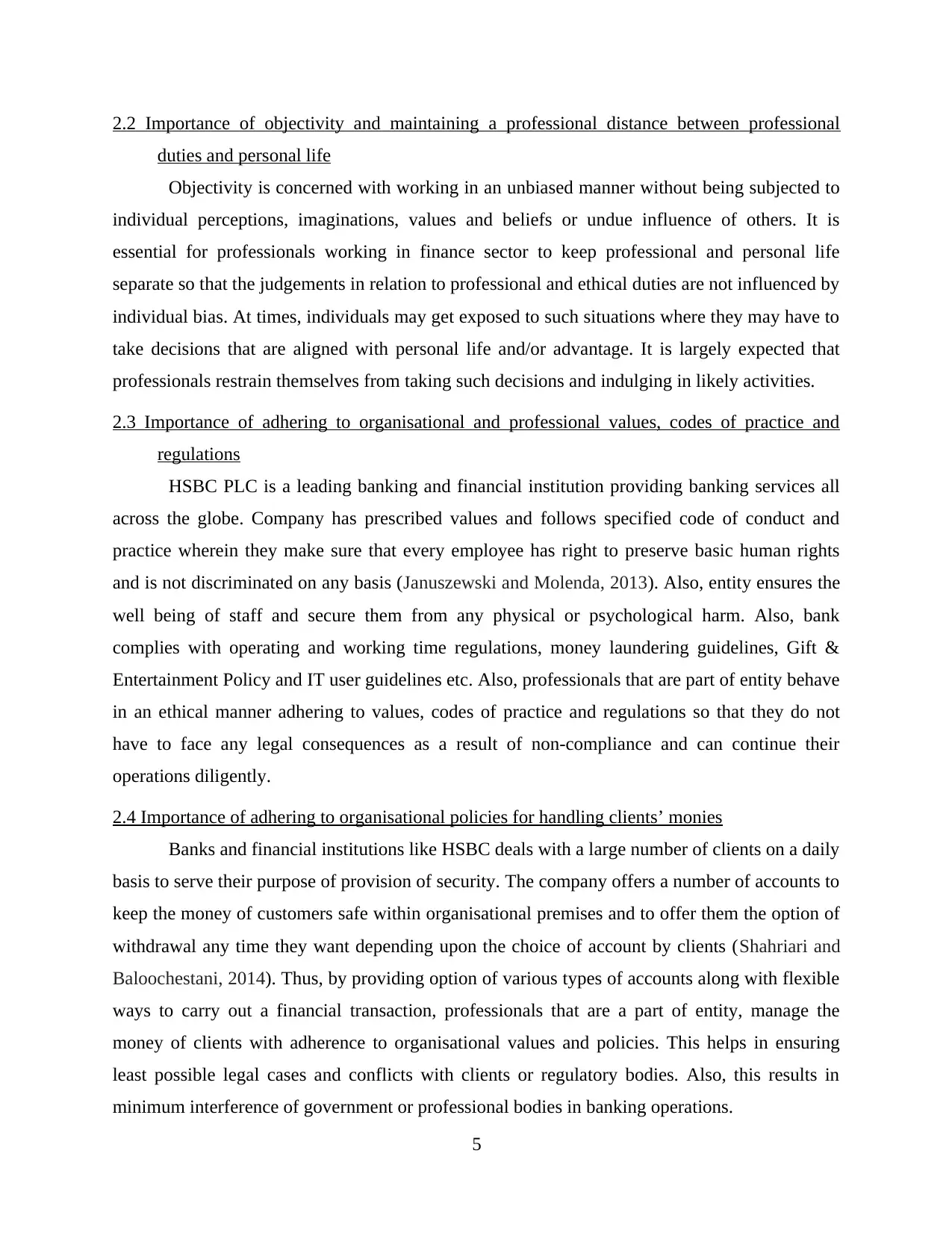
2.2 Importance of objectivity and maintaining a professional distance between professional
duties and personal life
Objectivity is concerned with working in an unbiased manner without being subjected to
individual perceptions, imaginations, values and beliefs or undue influence of others. It is
essential for professionals working in finance sector to keep professional and personal life
separate so that the judgements in relation to professional and ethical duties are not influenced by
individual bias. At times, individuals may get exposed to such situations where they may have to
take decisions that are aligned with personal life and/or advantage. It is largely expected that
professionals restrain themselves from taking such decisions and indulging in likely activities.
2.3 Importance of adhering to organisational and professional values, codes of practice and
regulations
HSBC PLC is a leading banking and financial institution providing banking services all
across the globe. Company has prescribed values and follows specified code of conduct and
practice wherein they make sure that every employee has right to preserve basic human rights
and is not discriminated on any basis (Januszewski and Molenda, 2013). Also, entity ensures the
well being of staff and secure them from any physical or psychological harm. Also, bank
complies with operating and working time regulations, money laundering guidelines, Gift &
Entertainment Policy and IT user guidelines etc. Also, professionals that are part of entity behave
in an ethical manner adhering to values, codes of practice and regulations so that they do not
have to face any legal consequences as a result of non-compliance and can continue their
operations diligently.
2.4 Importance of adhering to organisational policies for handling clients’ monies
Banks and financial institutions like HSBC deals with a large number of clients on a daily
basis to serve their purpose of provision of security. The company offers a number of accounts to
keep the money of customers safe within organisational premises and to offer them the option of
withdrawal any time they want depending upon the choice of account by clients (Shahriari and
Baloochestani, 2014). Thus, by providing option of various types of accounts along with flexible
ways to carry out a financial transaction, professionals that are a part of entity, manage the
money of clients with adherence to organisational values and policies. This helps in ensuring
least possible legal cases and conflicts with clients or regulatory bodies. Also, this results in
minimum interference of government or professional bodies in banking operations.
5
duties and personal life
Objectivity is concerned with working in an unbiased manner without being subjected to
individual perceptions, imaginations, values and beliefs or undue influence of others. It is
essential for professionals working in finance sector to keep professional and personal life
separate so that the judgements in relation to professional and ethical duties are not influenced by
individual bias. At times, individuals may get exposed to such situations where they may have to
take decisions that are aligned with personal life and/or advantage. It is largely expected that
professionals restrain themselves from taking such decisions and indulging in likely activities.
2.3 Importance of adhering to organisational and professional values, codes of practice and
regulations
HSBC PLC is a leading banking and financial institution providing banking services all
across the globe. Company has prescribed values and follows specified code of conduct and
practice wherein they make sure that every employee has right to preserve basic human rights
and is not discriminated on any basis (Januszewski and Molenda, 2013). Also, entity ensures the
well being of staff and secure them from any physical or psychological harm. Also, bank
complies with operating and working time regulations, money laundering guidelines, Gift &
Entertainment Policy and IT user guidelines etc. Also, professionals that are part of entity behave
in an ethical manner adhering to values, codes of practice and regulations so that they do not
have to face any legal consequences as a result of non-compliance and can continue their
operations diligently.
2.4 Importance of adhering to organisational policies for handling clients’ monies
Banks and financial institutions like HSBC deals with a large number of clients on a daily
basis to serve their purpose of provision of security. The company offers a number of accounts to
keep the money of customers safe within organisational premises and to offer them the option of
withdrawal any time they want depending upon the choice of account by clients (Shahriari and
Baloochestani, 2014). Thus, by providing option of various types of accounts along with flexible
ways to carry out a financial transaction, professionals that are a part of entity, manage the
money of clients with adherence to organisational values and policies. This helps in ensuring
least possible legal cases and conflicts with clients or regulatory bodies. Also, this results in
minimum interference of government or professional bodies in banking operations.
5
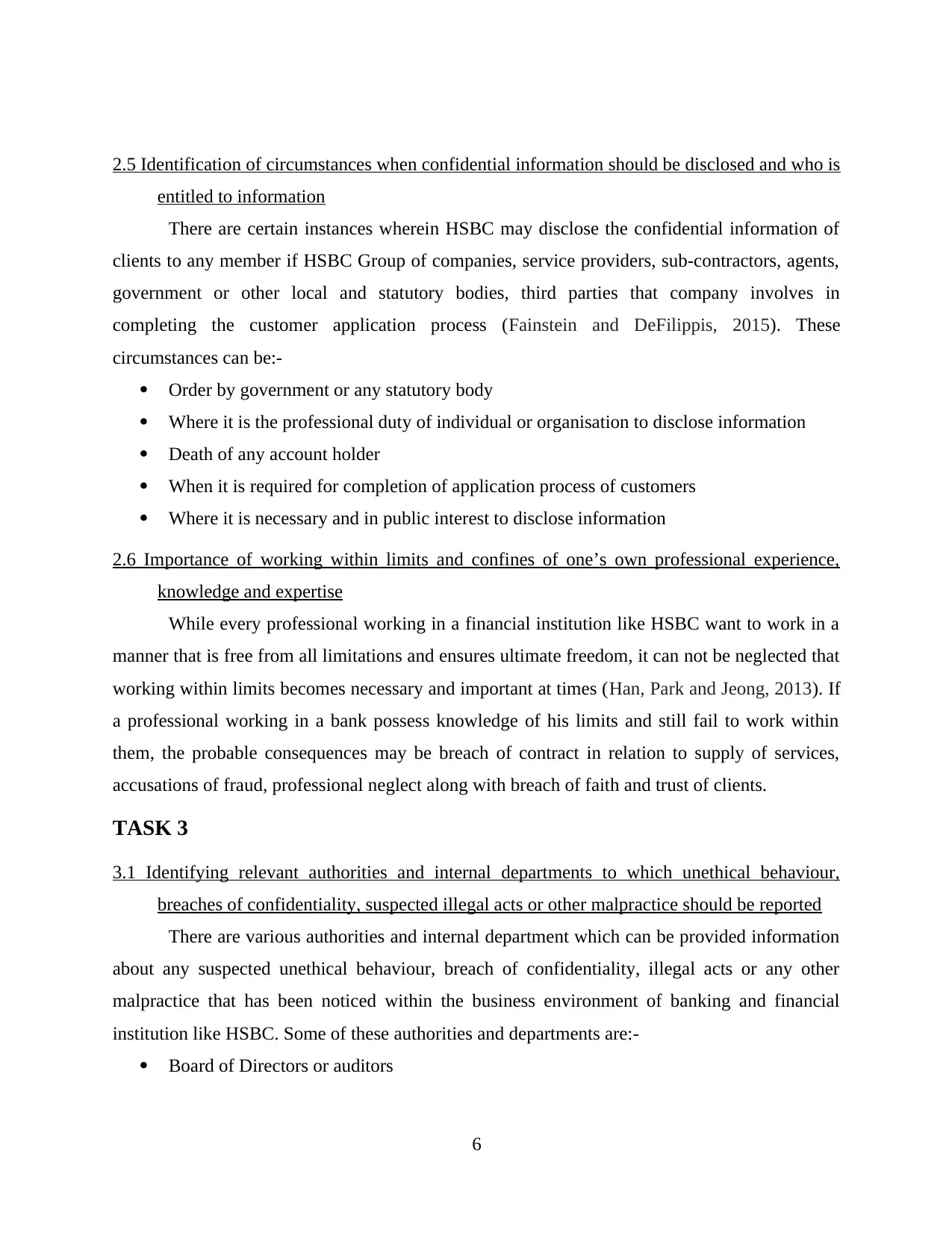
2.5 Identification of circumstances when confidential information should be disclosed and who is
entitled to information
There are certain instances wherein HSBC may disclose the confidential information of
clients to any member if HSBC Group of companies, service providers, sub-contractors, agents,
government or other local and statutory bodies, third parties that company involves in
completing the customer application process (Fainstein and DeFilippis, 2015). These
circumstances can be:-
Order by government or any statutory body
Where it is the professional duty of individual or organisation to disclose information
Death of any account holder
When it is required for completion of application process of customers
Where it is necessary and in public interest to disclose information
2.6 Importance of working within limits and confines of one’s own professional experience,
knowledge and expertise
While every professional working in a financial institution like HSBC want to work in a
manner that is free from all limitations and ensures ultimate freedom, it can not be neglected that
working within limits becomes necessary and important at times (Han, Park and Jeong, 2013). If
a professional working in a bank possess knowledge of his limits and still fail to work within
them, the probable consequences may be breach of contract in relation to supply of services,
accusations of fraud, professional neglect along with breach of faith and trust of clients.
TASK 3
3.1 Identifying relevant authorities and internal departments to which unethical behaviour,
breaches of confidentiality, suspected illegal acts or other malpractice should be reported
There are various authorities and internal department which can be provided information
about any suspected unethical behaviour, breach of confidentiality, illegal acts or any other
malpractice that has been noticed within the business environment of banking and financial
institution like HSBC. Some of these authorities and departments are:-
Board of Directors or auditors
6
entitled to information
There are certain instances wherein HSBC may disclose the confidential information of
clients to any member if HSBC Group of companies, service providers, sub-contractors, agents,
government or other local and statutory bodies, third parties that company involves in
completing the customer application process (Fainstein and DeFilippis, 2015). These
circumstances can be:-
Order by government or any statutory body
Where it is the professional duty of individual or organisation to disclose information
Death of any account holder
When it is required for completion of application process of customers
Where it is necessary and in public interest to disclose information
2.6 Importance of working within limits and confines of one’s own professional experience,
knowledge and expertise
While every professional working in a financial institution like HSBC want to work in a
manner that is free from all limitations and ensures ultimate freedom, it can not be neglected that
working within limits becomes necessary and important at times (Han, Park and Jeong, 2013). If
a professional working in a bank possess knowledge of his limits and still fail to work within
them, the probable consequences may be breach of contract in relation to supply of services,
accusations of fraud, professional neglect along with breach of faith and trust of clients.
TASK 3
3.1 Identifying relevant authorities and internal departments to which unethical behaviour,
breaches of confidentiality, suspected illegal acts or other malpractice should be reported
There are various authorities and internal department which can be provided information
about any suspected unethical behaviour, breach of confidentiality, illegal acts or any other
malpractice that has been noticed within the business environment of banking and financial
institution like HSBC. Some of these authorities and departments are:-
Board of Directors or auditors
6
⊘ This is a preview!⊘
Do you want full access?
Subscribe today to unlock all pages.

Trusted by 1+ million students worldwide
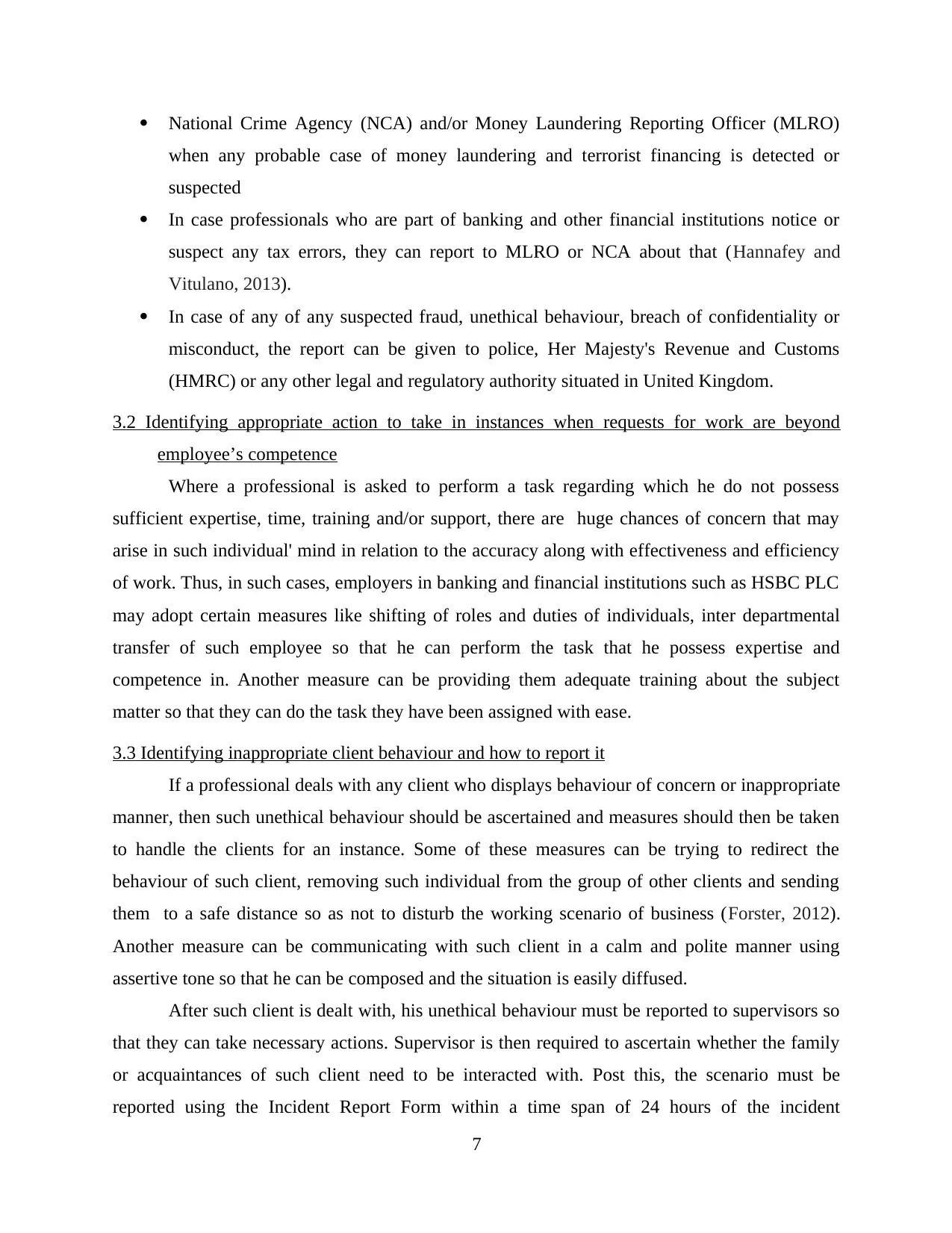
National Crime Agency (NCA) and/or Money Laundering Reporting Officer (MLRO)
when any probable case of money laundering and terrorist financing is detected or
suspected
In case professionals who are part of banking and other financial institutions notice or
suspect any tax errors, they can report to MLRO or NCA about that (Hannafey and
Vitulano, 2013).
In case of any of any suspected fraud, unethical behaviour, breach of confidentiality or
misconduct, the report can be given to police, Her Majesty's Revenue and Customs
(HMRC) or any other legal and regulatory authority situated in United Kingdom.
3.2 Identifying appropriate action to take in instances when requests for work are beyond
employee’s competence
Where a professional is asked to perform a task regarding which he do not possess
sufficient expertise, time, training and/or support, there are huge chances of concern that may
arise in such individual' mind in relation to the accuracy along with effectiveness and efficiency
of work. Thus, in such cases, employers in banking and financial institutions such as HSBC PLC
may adopt certain measures like shifting of roles and duties of individuals, inter departmental
transfer of such employee so that he can perform the task that he possess expertise and
competence in. Another measure can be providing them adequate training about the subject
matter so that they can do the task they have been assigned with ease.
3.3 Identifying inappropriate client behaviour and how to report it
If a professional deals with any client who displays behaviour of concern or inappropriate
manner, then such unethical behaviour should be ascertained and measures should then be taken
to handle the clients for an instance. Some of these measures can be trying to redirect the
behaviour of such client, removing such individual from the group of other clients and sending
them to a safe distance so as not to disturb the working scenario of business (Forster, 2012).
Another measure can be communicating with such client in a calm and polite manner using
assertive tone so that he can be composed and the situation is easily diffused.
After such client is dealt with, his unethical behaviour must be reported to supervisors so
that they can take necessary actions. Supervisor is then required to ascertain whether the family
or acquaintances of such client need to be interacted with. Post this, the scenario must be
reported using the Incident Report Form within a time span of 24 hours of the incident
7
when any probable case of money laundering and terrorist financing is detected or
suspected
In case professionals who are part of banking and other financial institutions notice or
suspect any tax errors, they can report to MLRO or NCA about that (Hannafey and
Vitulano, 2013).
In case of any of any suspected fraud, unethical behaviour, breach of confidentiality or
misconduct, the report can be given to police, Her Majesty's Revenue and Customs
(HMRC) or any other legal and regulatory authority situated in United Kingdom.
3.2 Identifying appropriate action to take in instances when requests for work are beyond
employee’s competence
Where a professional is asked to perform a task regarding which he do not possess
sufficient expertise, time, training and/or support, there are huge chances of concern that may
arise in such individual' mind in relation to the accuracy along with effectiveness and efficiency
of work. Thus, in such cases, employers in banking and financial institutions such as HSBC PLC
may adopt certain measures like shifting of roles and duties of individuals, inter departmental
transfer of such employee so that he can perform the task that he possess expertise and
competence in. Another measure can be providing them adequate training about the subject
matter so that they can do the task they have been assigned with ease.
3.3 Identifying inappropriate client behaviour and how to report it
If a professional deals with any client who displays behaviour of concern or inappropriate
manner, then such unethical behaviour should be ascertained and measures should then be taken
to handle the clients for an instance. Some of these measures can be trying to redirect the
behaviour of such client, removing such individual from the group of other clients and sending
them to a safe distance so as not to disturb the working scenario of business (Forster, 2012).
Another measure can be communicating with such client in a calm and polite manner using
assertive tone so that he can be composed and the situation is easily diffused.
After such client is dealt with, his unethical behaviour must be reported to supervisors so
that they can take necessary actions. Supervisor is then required to ascertain whether the family
or acquaintances of such client need to be interacted with. Post this, the scenario must be
reported using the Incident Report Form within a time span of 24 hours of the incident
7
Paraphrase This Document
Need a fresh take? Get an instant paraphrase of this document with our AI Paraphraser
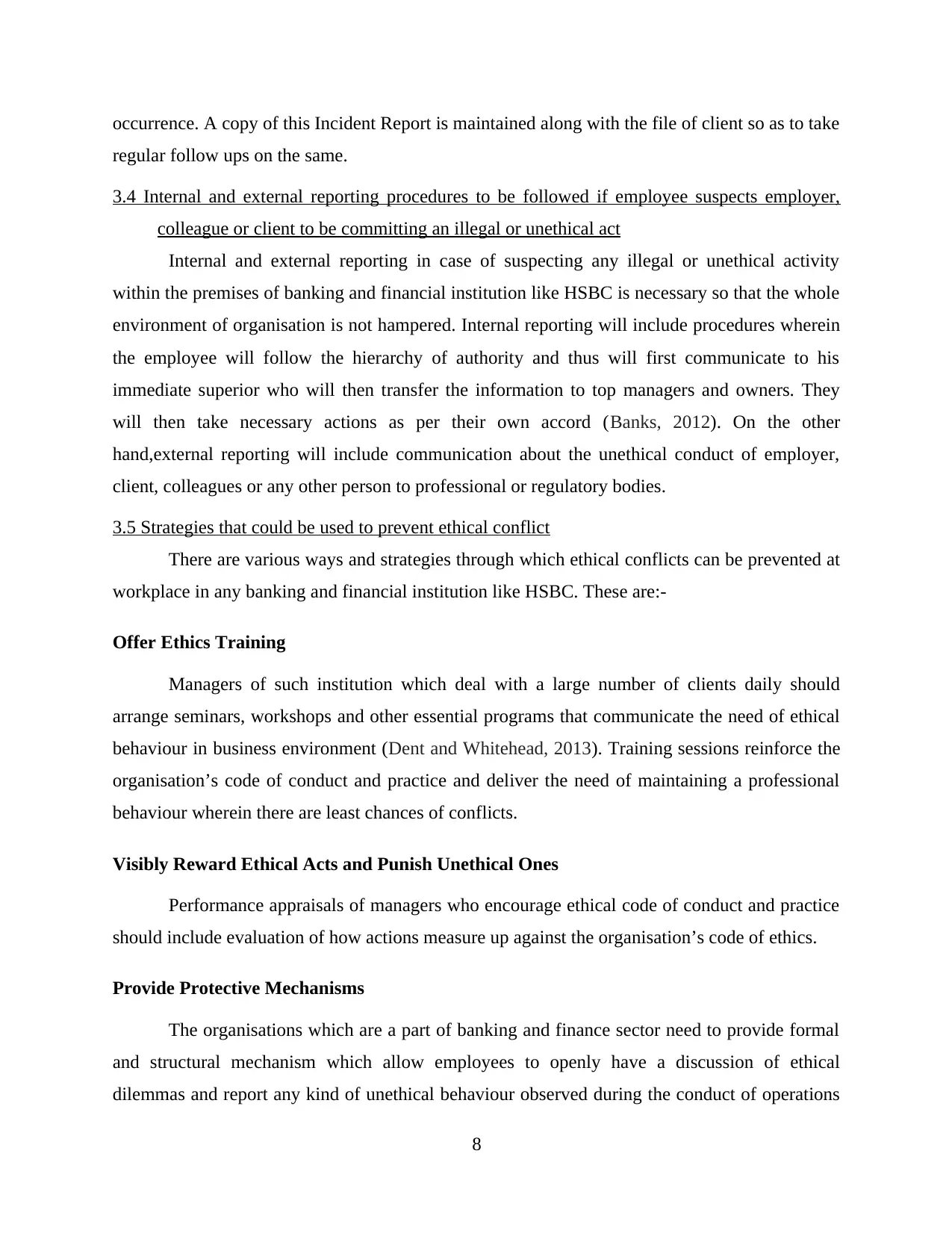
occurrence. A copy of this Incident Report is maintained along with the file of client so as to take
regular follow ups on the same.
3.4 Internal and external reporting procedures to be followed if employee suspects employer,
colleague or client to be committing an illegal or unethical act
Internal and external reporting in case of suspecting any illegal or unethical activity
within the premises of banking and financial institution like HSBC is necessary so that the whole
environment of organisation is not hampered. Internal reporting will include procedures wherein
the employee will follow the hierarchy of authority and thus will first communicate to his
immediate superior who will then transfer the information to top managers and owners. They
will then take necessary actions as per their own accord (Banks, 2012). On the other
hand,external reporting will include communication about the unethical conduct of employer,
client, colleagues or any other person to professional or regulatory bodies.
3.5 Strategies that could be used to prevent ethical conflict
There are various ways and strategies through which ethical conflicts can be prevented at
workplace in any banking and financial institution like HSBC. These are:-
Offer Ethics Training
Managers of such institution which deal with a large number of clients daily should
arrange seminars, workshops and other essential programs that communicate the need of ethical
behaviour in business environment (Dent and Whitehead, 2013). Training sessions reinforce the
organisation’s code of conduct and practice and deliver the need of maintaining a professional
behaviour wherein there are least chances of conflicts.
Visibly Reward Ethical Acts and Punish Unethical Ones
Performance appraisals of managers who encourage ethical code of conduct and practice
should include evaluation of how actions measure up against the organisation’s code of ethics.
Provide Protective Mechanisms
The organisations which are a part of banking and finance sector need to provide formal
and structural mechanism which allow employees to openly have a discussion of ethical
dilemmas and report any kind of unethical behaviour observed during the conduct of operations
8
regular follow ups on the same.
3.4 Internal and external reporting procedures to be followed if employee suspects employer,
colleague or client to be committing an illegal or unethical act
Internal and external reporting in case of suspecting any illegal or unethical activity
within the premises of banking and financial institution like HSBC is necessary so that the whole
environment of organisation is not hampered. Internal reporting will include procedures wherein
the employee will follow the hierarchy of authority and thus will first communicate to his
immediate superior who will then transfer the information to top managers and owners. They
will then take necessary actions as per their own accord (Banks, 2012). On the other
hand,external reporting will include communication about the unethical conduct of employer,
client, colleagues or any other person to professional or regulatory bodies.
3.5 Strategies that could be used to prevent ethical conflict
There are various ways and strategies through which ethical conflicts can be prevented at
workplace in any banking and financial institution like HSBC. These are:-
Offer Ethics Training
Managers of such institution which deal with a large number of clients daily should
arrange seminars, workshops and other essential programs that communicate the need of ethical
behaviour in business environment (Dent and Whitehead, 2013). Training sessions reinforce the
organisation’s code of conduct and practice and deliver the need of maintaining a professional
behaviour wherein there are least chances of conflicts.
Visibly Reward Ethical Acts and Punish Unethical Ones
Performance appraisals of managers who encourage ethical code of conduct and practice
should include evaluation of how actions measure up against the organisation’s code of ethics.
Provide Protective Mechanisms
The organisations which are a part of banking and finance sector need to provide formal
and structural mechanism which allow employees to openly have a discussion of ethical
dilemmas and report any kind of unethical behaviour observed during the conduct of operations
8
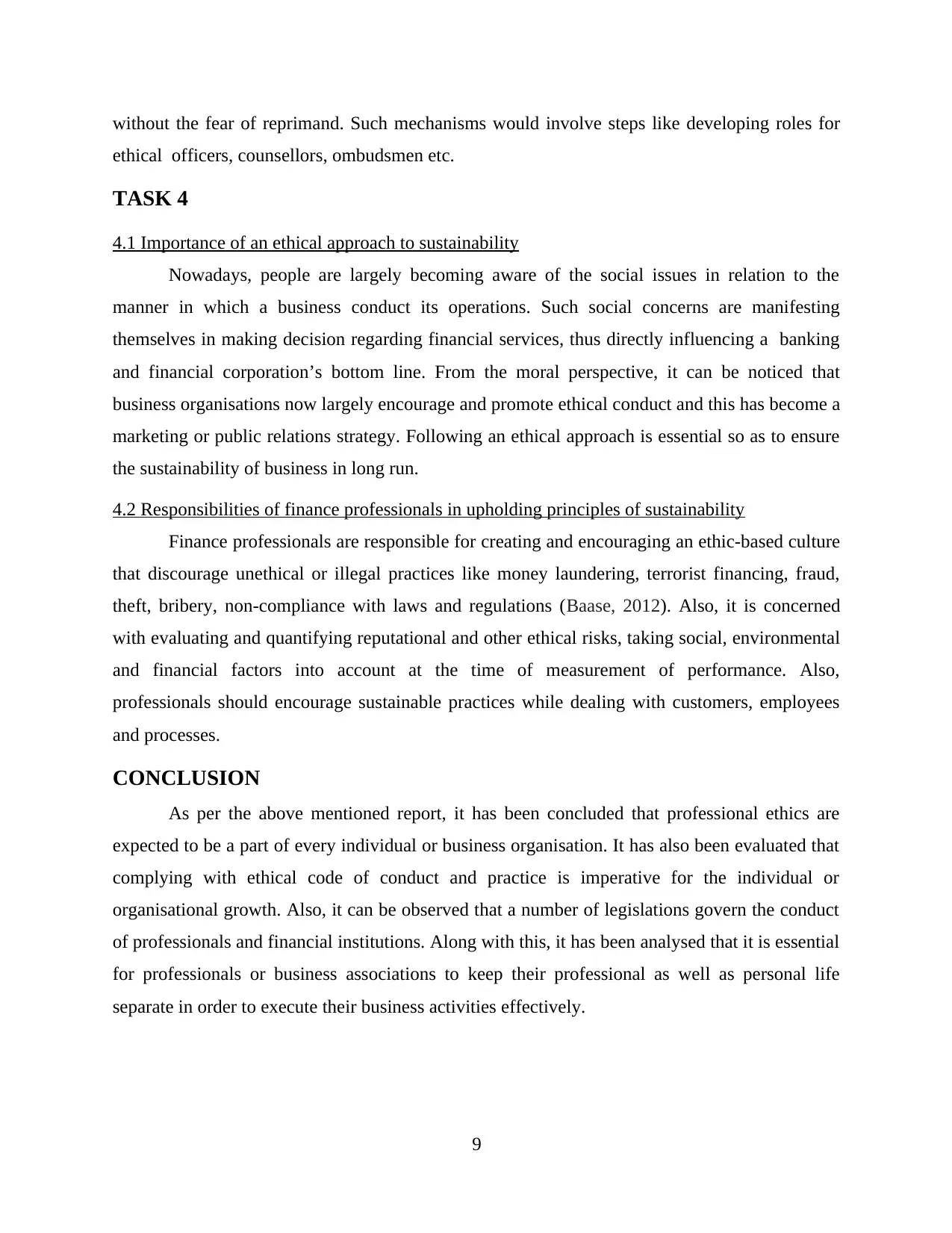
without the fear of reprimand. Such mechanisms would involve steps like developing roles for
ethical officers, counsellors, ombudsmen etc.
TASK 4
4.1 Importance of an ethical approach to sustainability
Nowadays, people are largely becoming aware of the social issues in relation to the
manner in which a business conduct its operations. Such social concerns are manifesting
themselves in making decision regarding financial services, thus directly influencing a banking
and financial corporation’s bottom line. From the moral perspective, it can be noticed that
business organisations now largely encourage and promote ethical conduct and this has become a
marketing or public relations strategy. Following an ethical approach is essential so as to ensure
the sustainability of business in long run.
4.2 Responsibilities of finance professionals in upholding principles of sustainability
Finance professionals are responsible for creating and encouraging an ethic-based culture
that discourage unethical or illegal practices like money laundering, terrorist financing, fraud,
theft, bribery, non-compliance with laws and regulations (Baase, 2012). Also, it is concerned
with evaluating and quantifying reputational and other ethical risks, taking social, environmental
and financial factors into account at the time of measurement of performance. Also,
professionals should encourage sustainable practices while dealing with customers, employees
and processes.
CONCLUSION
As per the above mentioned report, it has been concluded that professional ethics are
expected to be a part of every individual or business organisation. It has also been evaluated that
complying with ethical code of conduct and practice is imperative for the individual or
organisational growth. Also, it can be observed that a number of legislations govern the conduct
of professionals and financial institutions. Along with this, it has been analysed that it is essential
for professionals or business associations to keep their professional as well as personal life
separate in order to execute their business activities effectively.
9
ethical officers, counsellors, ombudsmen etc.
TASK 4
4.1 Importance of an ethical approach to sustainability
Nowadays, people are largely becoming aware of the social issues in relation to the
manner in which a business conduct its operations. Such social concerns are manifesting
themselves in making decision regarding financial services, thus directly influencing a banking
and financial corporation’s bottom line. From the moral perspective, it can be noticed that
business organisations now largely encourage and promote ethical conduct and this has become a
marketing or public relations strategy. Following an ethical approach is essential so as to ensure
the sustainability of business in long run.
4.2 Responsibilities of finance professionals in upholding principles of sustainability
Finance professionals are responsible for creating and encouraging an ethic-based culture
that discourage unethical or illegal practices like money laundering, terrorist financing, fraud,
theft, bribery, non-compliance with laws and regulations (Baase, 2012). Also, it is concerned
with evaluating and quantifying reputational and other ethical risks, taking social, environmental
and financial factors into account at the time of measurement of performance. Also,
professionals should encourage sustainable practices while dealing with customers, employees
and processes.
CONCLUSION
As per the above mentioned report, it has been concluded that professional ethics are
expected to be a part of every individual or business organisation. It has also been evaluated that
complying with ethical code of conduct and practice is imperative for the individual or
organisational growth. Also, it can be observed that a number of legislations govern the conduct
of professionals and financial institutions. Along with this, it has been analysed that it is essential
for professionals or business associations to keep their professional as well as personal life
separate in order to execute their business activities effectively.
9
⊘ This is a preview!⊘
Do you want full access?
Subscribe today to unlock all pages.

Trusted by 1+ million students worldwide
1 out of 13
Related Documents
Your All-in-One AI-Powered Toolkit for Academic Success.
+13062052269
info@desklib.com
Available 24*7 on WhatsApp / Email
![[object Object]](/_next/static/media/star-bottom.7253800d.svg)
Unlock your academic potential
Copyright © 2020–2026 A2Z Services. All Rights Reserved. Developed and managed by ZUCOL.





